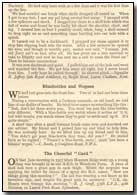Memoirs & Diaries - The Best 500 Cockney War Stories - The Cheerful "Card" and Other Stories
 Published in London
in 1921, The Best 500 Cockney War Stories
comprised, in the words of its newspaper publisher (The London Evening
News) "a remembering and retelling of those war days when laughter
sometimes saved men's reason".
Published in London
in 1921, The Best 500 Cockney War Stories
comprised, in the words of its newspaper publisher (The London Evening
News) "a remembering and retelling of those war days when laughter
sometimes saved men's reason".
The collection of short memoirs, some 500 in total, is divided into five categories - Action, Lull, Hospital, High Seas and Here and There. This page contains five stories from Action, led by The Cheerful "Card".
Other sections within the collection can be accessed using the sidebar to the right.
The Cheerful "Card"
On that June morning in 1917 when Messines Ridge went up, a young chap was brought in to our A.D.S. in Woodcote Farm. A piece of shell had torn a great gap in each thigh.
Whilst the sergeant was applying the iodine by means of a spray the M.O. asked, "How are things going this morning?" The lad was wearing a red heart as his battalion sign, and despite his great pain he answered: "O.K. sir. Hearts were trumps this morning."
R.J. Gyaff, 3/5th L.F.A., 47th Division, 20 Lawrie Park Road, Sydenham
Great Stuff This Shrapnel
During the retreat from Mons it was the cavalry's work to hold up the Germans as long as possible, to allow our infantry to get in position.
One day we had a good way to run to our horses, being closely pursued by the Germans. When we reached them we were all more or less out of breath. A little Cockney was so winded that he could hardly reach his stirrup, which kept slipping from under his foot.
Just then a shrapnel shell burst directly overhead, and the Cockney, without using his stirrup, vaulted clean into the saddle.
As we galloped off he gasped, "Blimey, don't they put new life in yer? They're as good as Kruschens."
E.H. (late R.H.G.), 87 Alpha Road, Surbiton, Surrey
Wot a War!
Three of us were sitting on the high ground on the Gallipoli Beach watching shells dropping from the Turk positions. A "G.S." wagon was proceeding slowly along below us, the driver huddled in his coat, for the air was chill.
Suddenly he jumped from the wagon and ran in our direction - he had heard the shell before we had.
The next moment the wagon was proceeding skywards in many directions, and the horses were departing at top speed in different directions.
The driver surveyed the scene for a moment and then in a very matter-of-fact voice said: "Blimey! See that? Now I suppose I've got to walk back, and me up all night - wot a war!" And away he trudged!
C. J. A., N.W.11
The Umpire
After a retreat in May 1915 we saw, lying between our fresh position and the German lines, an English soldier whom we took to be dead. Later, however, we advanced again, and discovered that the man was not dead, but badly wounded.
On being asked who he was, he replied in a very weak voice, "I fink I must be the blinkin' umpire."
W. King (late Royal Fusiliers), 94 Manor Grove, Richmond, Surrey
"Don't Tell 'Aig"
Little "Ginger" was the life and soul of our platoon until he was wounded on the Somme in 1918.
As he was carried off to the dressing-station he waved his hand feebly over the side of the stretcher and whispered, "Don't tell 'Aig! He'd worry somethin' shockin'."
G.E. Morris (late Royal Fusiliers), 368 Ivydale Road, Peckham Rye, S.E.15
Next - "...In Love and War" and four other stories
Both British and German fleets had around 45 submarines available at the time of the Battle of Jutland, but none were put to use.
- Did you know?
